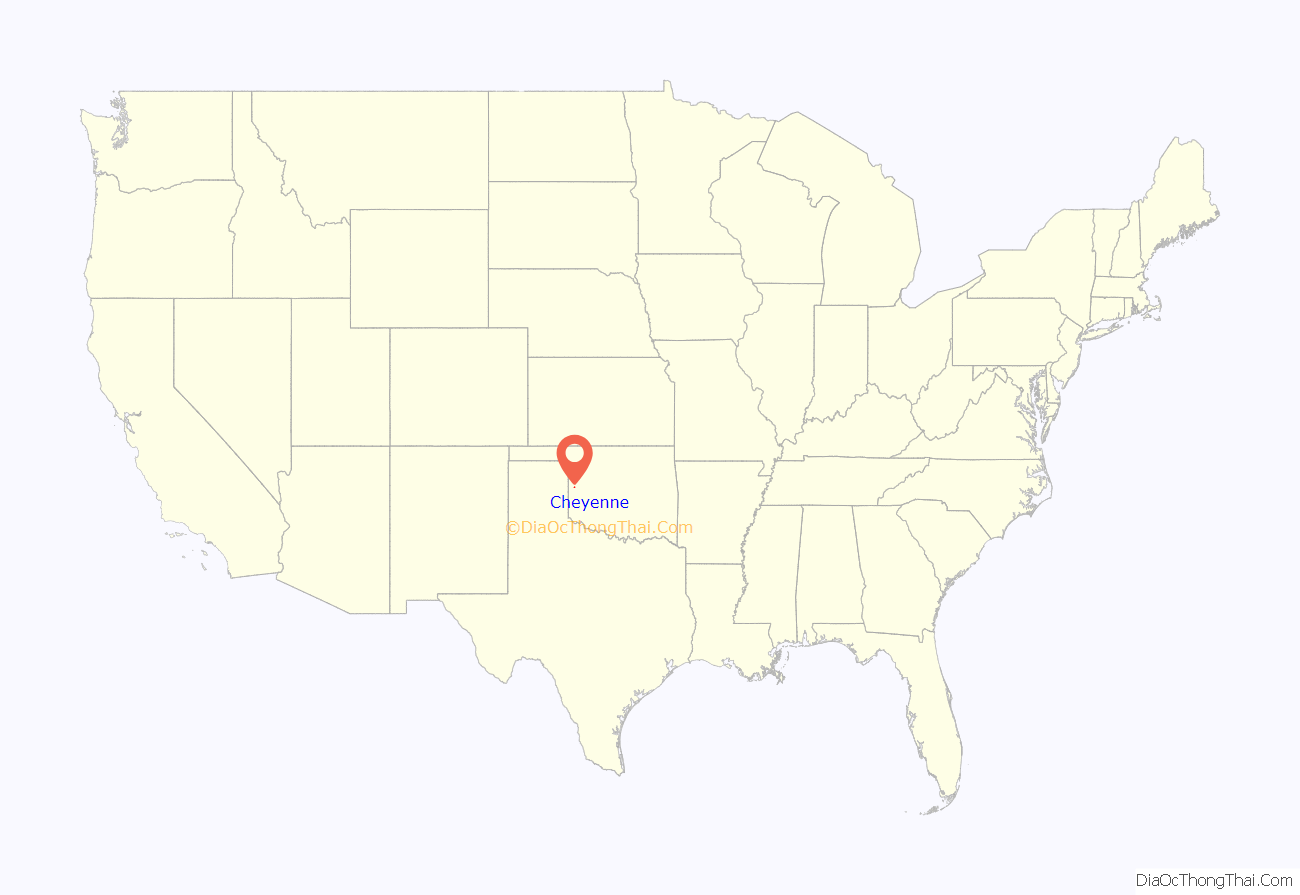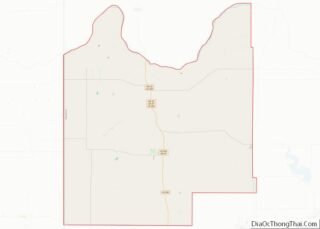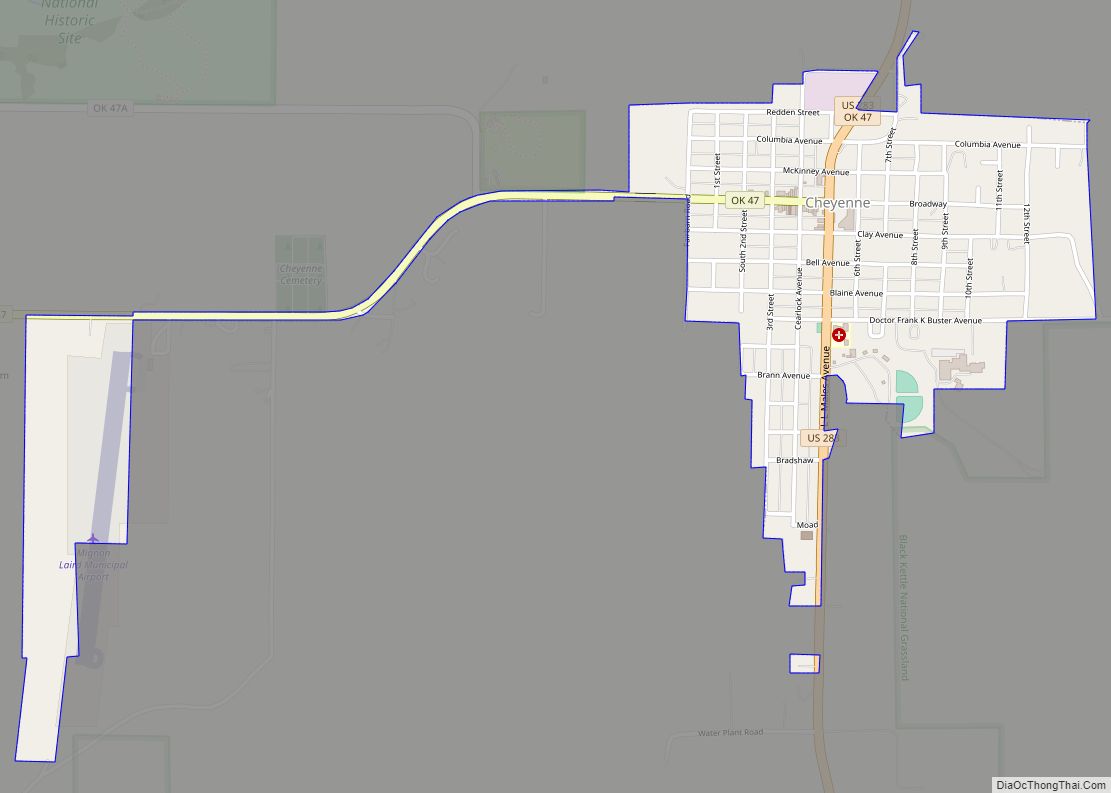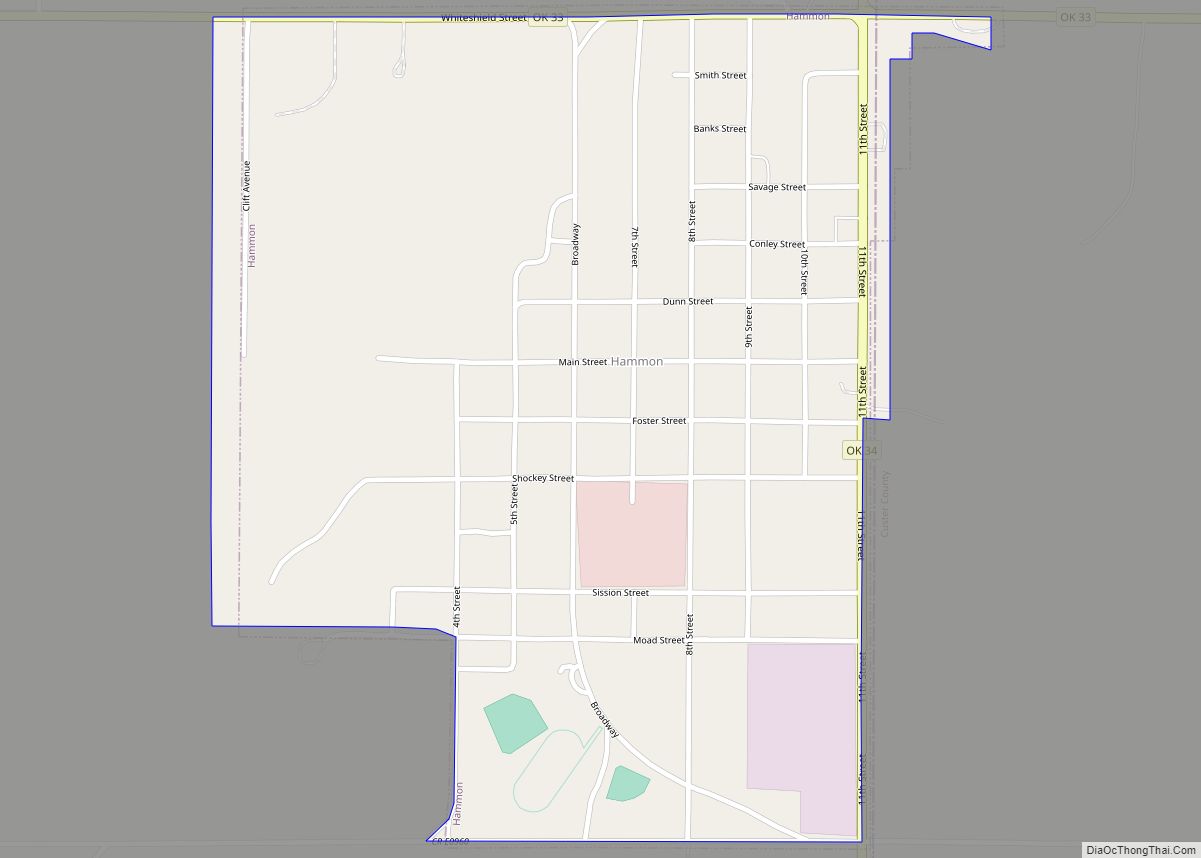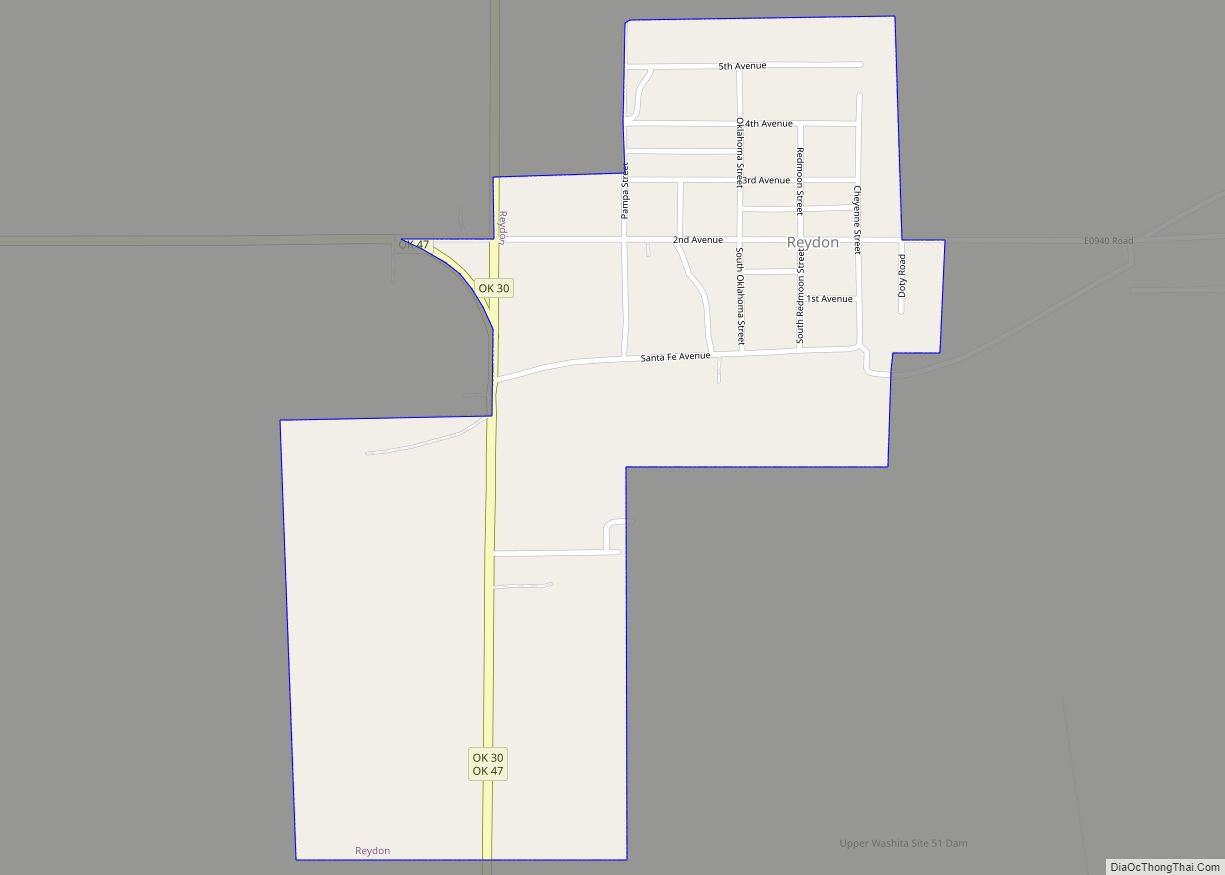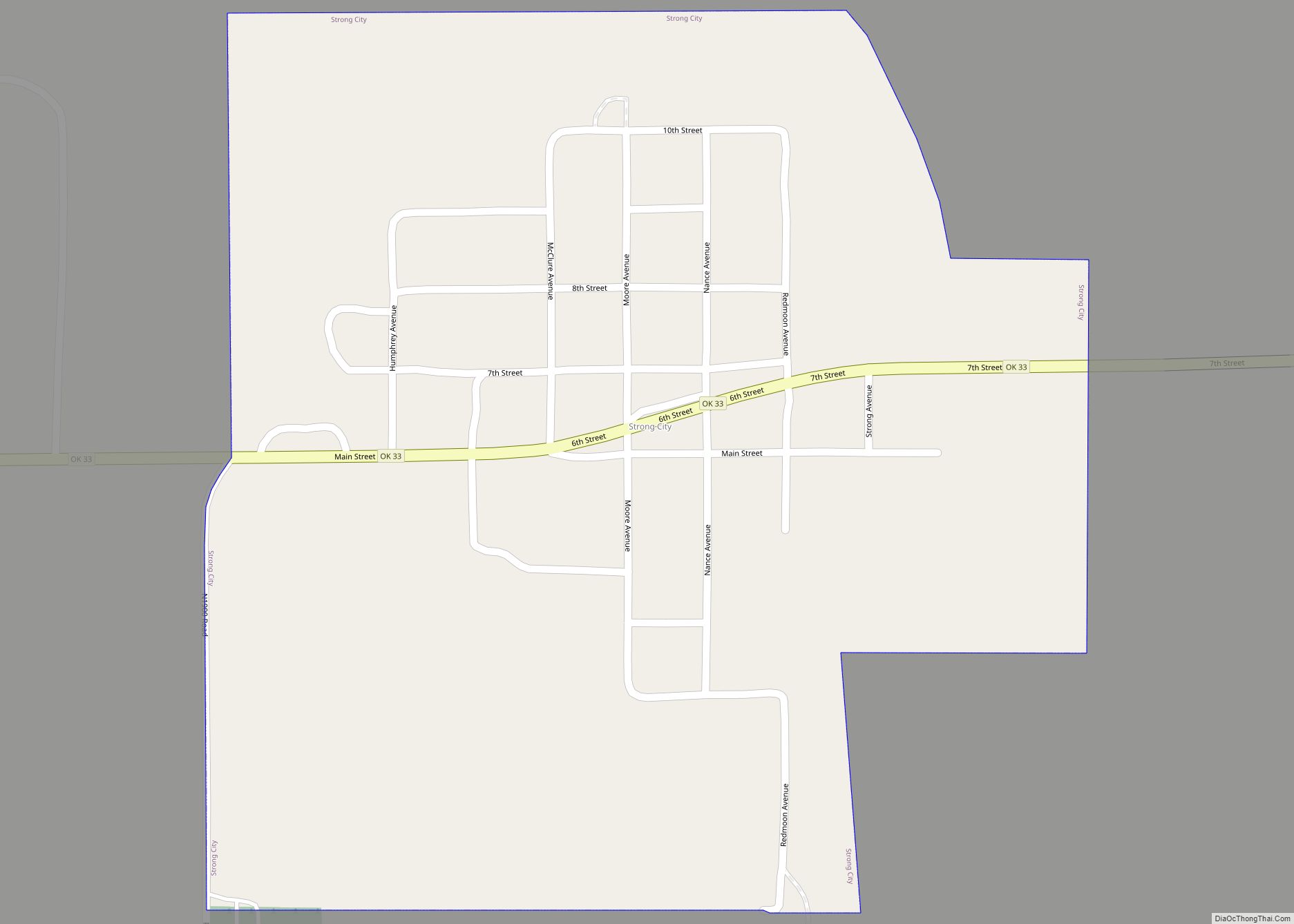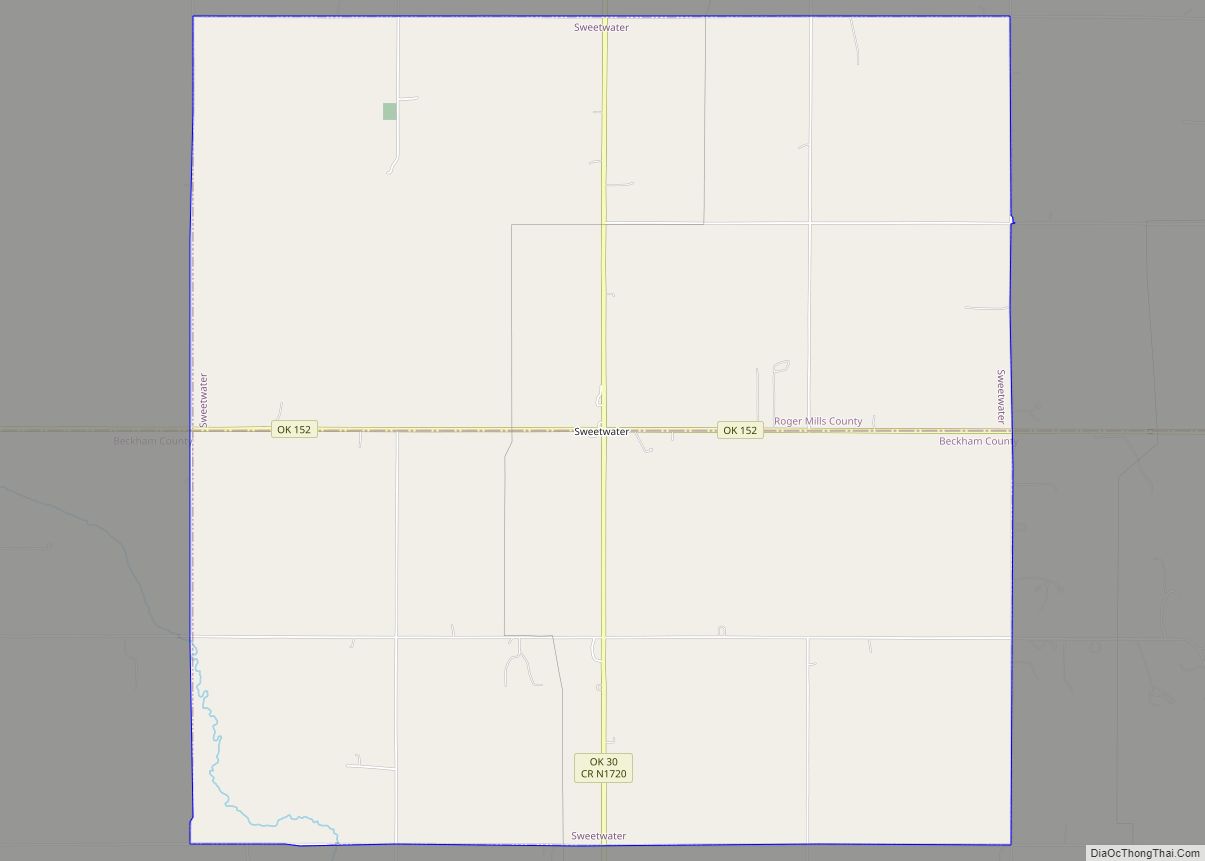Cheyenne is a town in Roger Mills County, Oklahoma, United States. The population was 801 at the 2010 census. It is the county seat of Roger Mills County.
| Name: | Cheyenne town |
|---|---|
| LSAD Code: | 43 |
| LSAD Description: | town (suffix) |
| State: | Oklahoma |
| County: | Roger Mills County |
| Elevation: | 1,968 ft (600 m) |
| Total Area: | 0.99 sq mi (2.56 km²) |
| Land Area: | 0.99 sq mi (2.56 km²) |
| Water Area: | 0.00 sq mi (0.00 km²) |
| Total Population: | 771 |
| Population Density: | 780.36/sq mi (301.40/km²) |
| ZIP code: | 73628 |
| Area code: | 580 |
| FIPS code: | 4013900 |
Online Interactive Map
Click on ![]() to view map in "full screen" mode.
to view map in "full screen" mode.
Cheyenne location map. Where is Cheyenne town?
History
Cheyenne is the location of the Battle of Washita River (also called Battle of the Washita; Washita Battlefield; Washita Massacre), where George Armstrong Custer’s 7th U.S. Cavalry attacked the sleeping Cheyenne village of Black Kettle on the Washita River on November 26, 1868.
Cheyenne has been a county seat since 1895. But construction of the nearest railroad into the area, the Clinton and Oklahoma Western Railway (“C&OW”) terminated in 1912 at Strong City, and that township was laid out with a rocky knoll in the center reserved for the County Courthouse should Strong City become the county seat instead of Cheyenne. To keep their town’s position, the citizens of Cheyenne responded by building the Cheyenne Short Line Railroad up the Washita River valley to Strong City to connect to the C&OW. In 1914 the courthouse in Cheyenne burned, and the fear again arose in Cheyenne that the citizens of Strong City would manage to have the new courthouse built there. But Cheyenne came up with the funding, and a new two-story brick courthouse was constructed in that town. Strong City remained a competitor for a while, and in 1932 managed to route a state highway (Oklahoma State Highway 33) through the locale, thus missing Cheyenne. But in the 1930s several business houses relocated from Strong City to Cheyenne, losing that town population and businesses while Cheyenne grew during the decade.
During the 1970s Cheyenne and the surrounding area benefited from the natural gas and oil development in the Panhandle-Hugoton field, the largest-volume gas field in the United States, and the world’s largest known source of helium. Between 1973 and 1993 the field produced over eight trillion cubic feet (230,000,000 m³) of gas.
1985–1987 Lady Bears
The Cheyenne High School girls six-on-six basketball team of 1985-1986-1987 won three straight state Class A titles going 88–4 over that time, including winning their last 42 games. Prior to the 1985 season, the team had won only two district titles in 20 years, and had never been to the state tournament. The 42 game streak included the last half of the 1986 season and all of the 1987 season, going 30–0. The four loses were by a combined 5 total points. After winning their third straight title, the Lady Bears (coached by David Sanders), tied a record that stood for 49 years, held by Byng, 1936–1937–1938.
For their first title in 1985 Cheyenne went 29–2, including winning their final 23 games, and defeated Lookeba-Sickles, 45–42, in the championship. The following season they shot 73.0% from the field for the year, went 29–2 again, and beat Amber-Pocasset 61–49 in the championship game. In the final championship game of the three-year run, the undefeated Bears beat the 1980s best Class A team, the Thomas Terrierettes, 65–42.
Cheyenne was led by Jodi Fisher (26.7 points per game), Cindy Smith, Jenny Shockey, Leana Burrows, and Sherry Hillman (also contributing one season each to the three-year run: Julie Barton—1985, Lori Sanders—1987, and Cindy Hay—1987). Fisher, Hillman, Burrows were named to the 1985 and 1986 Class A Girls All-Tournament team. In the first round of the 1986 finals Fisher scored 52 points against Macomb, setting an Oklahoma state girls basketball tournament’s single-game scoring record. Fisher ended the three state tournament games with 121 points, needing just eight more to tie Thomas’s Kelli Litsch’s tournament point record, and was named to the 1986 Class A Girls All-Tournament 1st Team. Fisher was also named to The Daily Oklahoman’s “Super 6” team for 1987, and coach Sanders was named the 6-on-6 “Coach of the Year” that same season.
B.C. Scouting Service rated Fisher as the top women’s basketball recruit in the state of Oklahoma for the 1987 season and she was named an All-American honorable mention by USA Today. For the 1987 Class A Girls All-Tournament 1st Team Cheyenne had three of the six selections, forwards Jodi Fisher and Cindy Smith, and guard Cindy Hay (Thomas had two, forward Staci Litsch [scored 100 points in three state tournament games and is Kelli’s little sister] and guard Deena Garner; Johnna Ellis, of Tupelo received the other selection).
Fisher went on to play for the Oklahoma State Cowgirls where she tied a school record for career games played with 124 (with Lisa McGill and Liz Brown), she also set the OSU record for field-goal percentage in a season with 61.3% in the 1990–91 season. She left OSU ranked second in block shots (77), number eight on the all-time rebound list (525), 16th in field goals made with 334, collected 113 career steals from 1987 to 1991 (18th), 20th in career assists (150), and 823 career points (20th on the school’s all-time scoring list). She tied a school record for rebounds by an individual in an NCAA Tournament game with 12 against DePaul in the opening round game in 1991. On January 24, 1990, Fisher scored 23 points in a 99–94 win over the Oklahoma Sooners. She was on the 1991 OSU team that made it to the Sweet 16 in the NCAA tournament, the first OSU team to make it that far, and averaged 10.9 points a game that season.
2010–2013 Cheyenne Bears
The Bears also made a historic run as area champions and state qualifiers in men’s basketball from 2010 to 2013, winning a state championship in 2012 and state runner-up in 2011.
Cheyenne Road Map
Cheyenne city Satellite Map
Geography
Cheyenne is located just south of the Washita River, approximately 23 miles (37 km) north of Sayre. The town is in Southwestern Oklahoma, known for Oklahoma Tourism purposes as Great Plains Country.
According to the United States Census Bureau, the town has a total area of 1.0 square mile (2.6 km), all land.
Distances
- 81 miles (130 km) north of Altus
- 155 miles (249 km) east of Amarillo
- 29 miles (47 km) northwest of Elk City
- 150 miles (240 km) west of Oklahoma City
- 77 miles (124 km) south of Woodward
See also
Map of Oklahoma State and its subdivision:- Adair
- Alfalfa
- Atoka
- Beaver
- Beckham
- Blaine
- Bryan
- Caddo
- Canadian
- Carter
- Cherokee
- Choctaw
- Cimarron
- Cleveland
- Coal
- Comanche
- Cotton
- Craig
- Creek
- Custer
- Delaware
- Dewey
- Ellis
- Garfield
- Garvin
- Grady
- Grant
- Greer
- Harmon
- Harper
- Haskell
- Hughes
- Jackson
- Jefferson
- Johnston
- Kay
- Kingfisher
- Kiowa
- Latimer
- Le Flore
- Lincoln
- Logan
- Love
- Major
- Marshall
- Mayes
- McClain
- McCurtain
- McIntosh
- Murray
- Muskogee
- Noble
- Nowata
- Okfuskee
- Oklahoma
- Okmulgee
- Osage
- Ottawa
- Pawnee
- Payne
- Pittsburg
- Pontotoc
- Pottawatomie
- Pushmataha
- Roger Mills
- Rogers
- Seminole
- Sequoyah
- Stephens
- Texas
- Tillman
- Tulsa
- Wagoner
- Washington
- Washita
- Woods
- Woodward
- Alabama
- Alaska
- Arizona
- Arkansas
- California
- Colorado
- Connecticut
- Delaware
- District of Columbia
- Florida
- Georgia
- Hawaii
- Idaho
- Illinois
- Indiana
- Iowa
- Kansas
- Kentucky
- Louisiana
- Maine
- Maryland
- Massachusetts
- Michigan
- Minnesota
- Mississippi
- Missouri
- Montana
- Nebraska
- Nevada
- New Hampshire
- New Jersey
- New Mexico
- New York
- North Carolina
- North Dakota
- Ohio
- Oklahoma
- Oregon
- Pennsylvania
- Rhode Island
- South Carolina
- South Dakota
- Tennessee
- Texas
- Utah
- Vermont
- Virginia
- Washington
- West Virginia
- Wisconsin
- Wyoming
